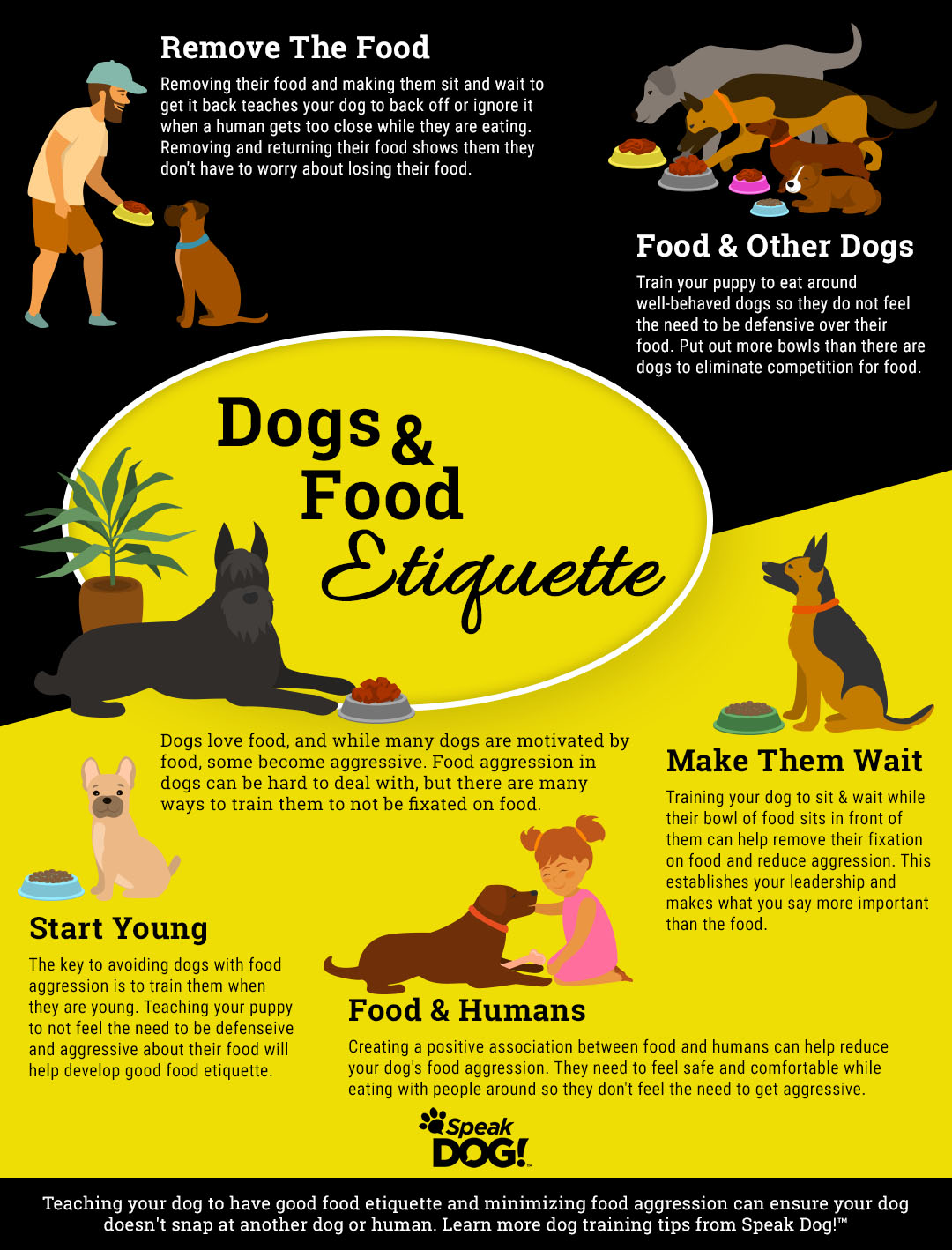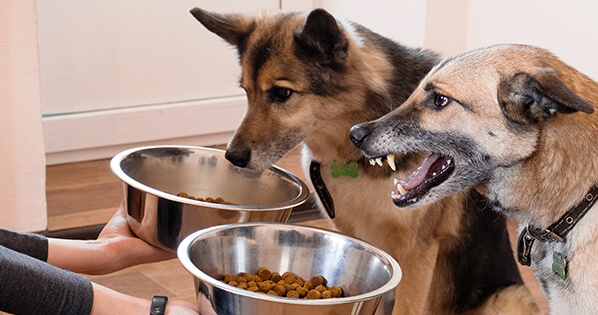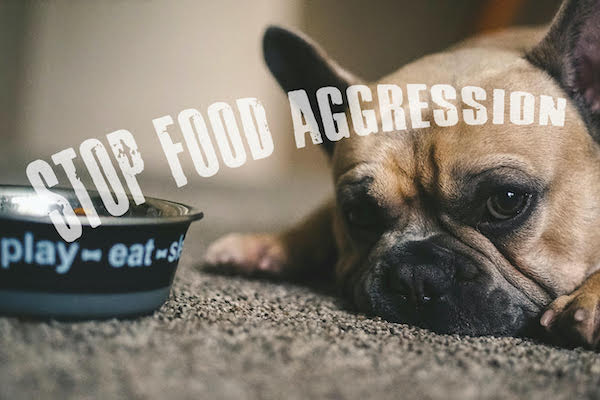To stop food aggression in dogs, redirect their attention from the food, teach good manners, and implement specialized home retraining to reduce aggressive behavior. Food aggression in dogs can be caused by trauma, physical abuse, or breed characteristics.
It is important to gradually build trust and familiarity around food and expose the dog to different people during mealtimes. Spaying or neutering the dog can also help reduce aggressive behaviors. If your dog already shows signs of food aggression, seeking guidance from a veterinary professional and an animal behaviorist is crucial to developing an appropriate treatment plan.

Understanding Food Aggression In Dogs
Understanding food aggression in dogs is crucial to preventing and stopping this behavior. By implementing training techniques, such as redirecting attention from the food, teaching good manners, and gradually getting closer to the dog while they eat, it is possible to help the dog overcome their food aggression.
Causes Of Food Aggression
Food aggression in dogs can stem from various underlying causes. Understanding these causes is crucial for effectively addressing and managing this problem behavior.
Signs And Symptoms
Recognizing the signs and symptoms of food aggression is essential for early intervention. Some common indicators include growling, snarling, guarding food, snapping, or even biting when approached while eating. It’s important to note that food aggression can escalate over time if not appropriately addressed.
Impact On Behavior
Food aggression can negatively impact a dog’s overall behavior and well-being. It can cause anxiety and stress and diminish their quality of life. Additionally, it can strain the relationship between the dog and their human family members or pose a risk to other animals or even humans in the household.
Understanding the causes of food aggression, recognizing the signs and symptoms, and being aware of its impact on behavior are crucial steps in addressing and resolving this behavioral issue in dogs. With the proper knowledge and approach, stopping food aggression and creating a safe and harmonious environment for everyone involved is possible.
Preventing And Managing Food Aggression
Are you struggling with food aggression in your dog? Learn how to stop this behavior with expert tips and techniques to prevent and manage dog food aggression. Find out how to redirect attention, teach good manners, and develop a specialized home retraining plan to eliminate or reduce aggressive behavior.
Spaying/Neutering to Reduce Aggression
Spaying or neutering your dog can help reduce aggressiveness, including food aggression. When dogs are spayed or neutered, their hormones are balanced, which can lead to a calmer temperament.
Training Techniques
Training your dog is essential in managing and preventing food aggression. Positive reinforcement techniques, such as rewards for good behavior, can help teach your dog that sharing their food is a positive experience.
Here are some training techniques to try:
- Talk to your dog while they eat to establish communication and trust.
- Gradually get closer to your dog while they eat to desensitize them to people being nearby.
- Hand-feed your dog treats as they decay to create positive associations with others approaching their food.
Creating A Positive Feeding Environment
The feeding environment plays a crucial role in preventing food aggression in dogs. Creating a positive and controlled environment can help your dog feel safe and relaxed during mealtime.
Here are some tips for creating a positive feeding environment:
- Feed your dog in a separate area away from other pets to avoid competition or anxiety.
- Establish a consistent feeding schedule so your dog knows when to expect food.
- Use a designated feeding area, like a feeding mat or bowl, to signal that it’s mealtime.
Remember, each dog is unique, and it may take time and patience to address food aggression effectively. Consult with a professional dog trainer or behaviorist for personalized guidance and support.
Seeking Professional Help
If your dog exhibits food aggression, seeking professional help is crucial. A veterinary professional and an animal behaviorist will evaluate your dog and develop a specialized treatment plan to eliminate or reduce the aggressive behavior.
In some cases, addressing food aggression in dogs may require professional help. Consulting a veterinary professional and working with an animal behaviorist can provide valuable insights and guidance in developing a treatment plan.
Consulting A Veterinary Professional
It is crucial to consult a veterinary professional when dealing with food aggression in dogs. They can rule out any medical conditions contributing to the aggressive behavior. Additionally, veterinarians have extensive knowledge of dog behavior and can provide recommendations based on their expertise.
Working With An Animal Behaviorist
An animal behaviorist specializes in understanding the psychological and behavioral aspects of animals. Working with an animal behaviorist can be beneficial in identifying the underlying causes of food aggression and developing a comprehensive treatment plan. They will thoroughly assess your dog’s behavior and provide tailored strategies to modify and manage the aggressive tendencies.
Developing A Treatment Plan
Once your veterinary professional and the animal behaviorist have been evaluated, an appropriate treatment plan will be developed and initiated. This plan may involve behavior modification techniques and training exercises to help your dog overcome food aggression. It may also include management strategies, such as feeding your dog in a separate area or using specialized bowls or feeding methods to reduce the likelihood of aggressive behavior.
It’s important to note that resolving food aggression in dogs may take time and patience. Consistency and positive reinforcement are critical elements in successfully modifying aggressive behavior. By working closely with veterinary professionals and behaviorists, you can ensure that the treatment plan is tailored to your dog’s needs and contributes to their overall well-being.
Remember, seeking professional help is a proactive step towards addressing dog food aggression and ensuring a safe and harmonious environment for your pet and your family.


Frequently Asked Questions For How To Stop Food Aggression In Dogs
Can Food Aggression In Dogs Be Cured?
Yes, food aggression in dogs can be cured through an appropriate treatment plan developed by veterinary professionals and animal behaviorists. This may include specialized home retraining to eliminate or reduce aggressive behavior in dogs.
How Do You Break A Dog From Food Aggression?
To break a dog from food aggression: 1. Talk to your dog while they eat. 2. Gradually get closer to your dog while they eat. 3. Get next to your dog’s bowl as they eat. 4. Hand-feed your dog treats as they eat.
5. Touch your dog’s bowl during mealtimes. 6. Pick up your dog’s bowl during mealtimes. 7. Repeat the steps with different people. Remember to consult with a professional for guidance.
What Causes Food Aggression In Dogs?
Food aggression in dogs can be caused by various factors, including trauma, physical abuse, fighting with other dogs, and certain breeds with strong guarding instincts. Veterinary professionals and animal behaviorists can develop a specialized treatment plan to eliminate or reduce this aggressive behavior.
Do Dogs Outgrow Food Aggression?
Yes, dogs can outgrow food aggression as they learn to trust the people in their household. However, they may still exhibit food aggression around other family members or guests. Trauma and certain breeds with guarding solid instincts can cause dog food aggression.
Specialized home retraining and treatment plans can help reduce this behavior.
Conclusion
To stop food aggression in dogs, seeking professional guidance from a veterinary professional and an animal behaviorist is essential. Once a thorough evaluation has been done, a specialized treatment plan can be developed and implemented. This may involve retraining your dog at home to eliminate or reduce aggressive behaviors.
Remember, patience and consistency are key when addressing food aggression in dogs. Following these steps can create a safer and happier environment for you and your furry friend.

